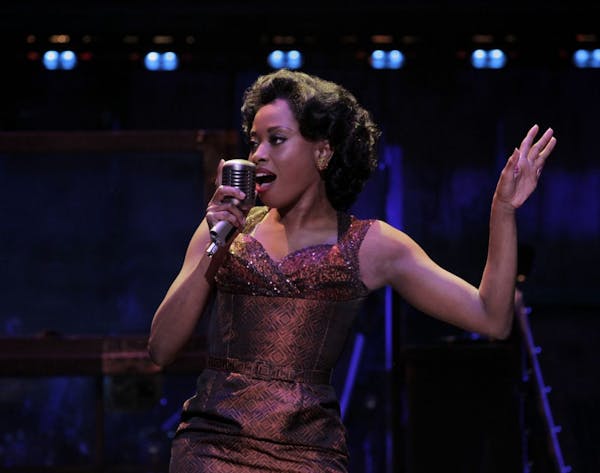No matter how many ways they play it, rock 'n' roll always saves the day. "Memphis" is the latest musical to re-tell us how a gritty, bluesy music spawned in African-American clubs changed the nation when it crossed over to white audiences.
The 2010 Tony winner as best musical, "Memphis" lacks the cheek and originality of "Hairspray," which trafficked in the same themes and plot points. It offers less dramatic weight and redemptive power than "Dream Girls," another show that's drawn comparisons. The first national tour of "Memphis" cruised into the Ordway Center on Tuesday night. A sufficiently talented cast and some brawny vocal gymnastics augur well for audiences but honestly, you could set your watch to Joe DiPietro's script.
In 1950s Memphis, slacker Huey Calhoun (Bryan Fenkart) digs the "race music" he hears on Beale Street. He particularly likes club singer Felicia (Felicia Boswell) and promises he'll get her voice on the radio -- once he gets a DJ job.
The two get romantic, despite the perorations of Huey's Mama (Julie Johnson) and Felicia's brother Delray (Quentin Earl Darrington). Do you suppose that late in the second act these two curmudgeons will turn soft? Ah, you've been reading ahead -- or simply stayed awake during 80 years of musical-theater history. The story's other beats -- a bigot attack, a network exec's racial whitewashing -- are every bit as predictable.
The only mystery in this production: what does Felicia see in Huey? Imagine Diana Ross looking at Goober Pyle and saying, "Yeah, that's a good thing."
I know, it's a musical; suspend disbelief.
As the clichés pile up, "Memphis" does have a muscular approximation of what rhythm and blues might have sounded like way back -- approximation, mind you, not authentic. Composer David Bryan is, after all, keyboardist for Bon Jovi -- not the first name in R&B.
Nonetheless, Bryan has built some strong chord progressions that provide enough melody for the vocalists to fly high on their own. These musical high points come at the right times to distract us from the story's humdrum.
Boswell gets to spill her soul on "Colored Woman" and "Someday;" Johnson gets up on her hind legs in "Change Don't Come Easy." Darrington stays more within the lines, but his pipes impress. Rhett George and Will Mann kick out the jambs in supporting roles.
Fenkart offers less to listen to -- worthwhile only in Huey's 11 o'clock number, "Memphis Lives in Me."
Sergio Trujillo's choreography animates the show with the requisite kicky and athletic motifs of early rock 'n' roll. For all the dance and music, though, director Christopher Ashley can't elevate "Memphis" to become anything more than a familiar cartoon.

Minnesota Sports Hall of Fame: A class-by-class list of all members

This retired journalist changed professional wrestling from Mankato

